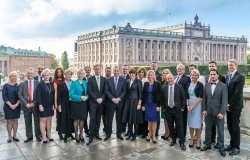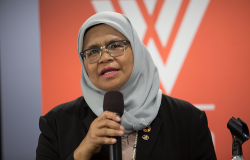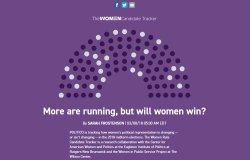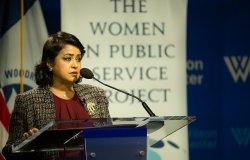Women Leaders Against Corruption: What Works
On February 18, 2016, the Women in Public Service Project, the Africa Program, and the Rule of Law Initiative at the Wilson Center co-hosted the event “Women Leaders Against Corruption: What Works.” Gwen Young, Director of the Women in Public Service Project at the Wilson Center, moderated the event and gave opening remarks. The panelists included: Betty Bigombe, Senior Director for Fragility, Conflict and Violence at the World Bank and former State Minister for Water Resources, Uganda; Aminata Niane, Lead Advisor, Office of the Vice President of Infrastructure, Private Sector and Regional Integration, African Development Bank; former Special Advisor to the President of the Republic of Senegal; and former Managing Director, APIX; and Lindiwe Mazibuko, Former Leader of the Official Opposition, Parliament of South Africa.
Overview
On February 18, 2016, the Women in Public Service Project, the Africa Program, and the Rule of Law Initiative at the Wilson Center co-hosted the event “Women Leaders Against Corruption: What Works.” Gwen Young, Director of the Women in Public Service Project at the Wilson Center, moderated the event and gave opening remarks. The panelists included: Betty Bigombe, Senior Director for Fragility, Conflict and Violence at the World Bank and former State Minister for Water Resources, Uganda; Aminata Niane, Lead Advisor, Office of the Vice President of Infrastructure, Private Sector and Regional Integration, African Development Bank; former Special Advisor to the President of the Republic of Senegal; and former Managing Director, APIX; and Lindiwe Mazibuko, Former Leader of the Official Opposition, Parliament of South Africa.
Gwen Young opened the discussion by referencing a survey which states that Africa is perceived as the most corrupt and underdeveloped region in the world. “But today,” Young explained, “we want to focus less on ‘what is corruption,’ and more on what is happening to curb corruption.” She asked each panelist to discuss their personal experiences in fighting corruption, and the role public administrators can play in ending corruption.
Lindiwe Mazibuko explained the role parliament plays as an anti-corruption watchdog in South Africa. “Because parliament is a creature of the constitution,” Mazibuko said, “and South Africa has one of the best constitutions in the world… We also have in parliament institutions with enormous powers, with the ability to hold the government accountable in a very effective way. And despite the strict PR system under which we operate, […] we still have the ability to keep the government on its toes.” If politicians are engaging in corruption, she noted, their political opponents can and will expose them for their own political gain. Mazibuko explained that South Africa has several independent institutions in which candidates are appointed, held accountable, and financed by parliament, increasing their freedom to prosecute corruption elsewhere in the government. These institutions, like the offices of the Auditor General and the Ombudsman, “have effectively become de-facto corruption watchdogs.” Mazibuko concluded by stressing that women have the ability to hold governments accountable. She commented on the myth that women are less likely to engage in corruption, saying that according to her experience, women have been just as likely to suborn the government as men. She concluded by saying, “the big agenda challenge for women… is actually holding governments accountable.”
Betty Bigombe stated that as a government minister she was confronted by both grand corruption, carried out by major companies or public officials on a huge scale, and petty corruption, which ordinary citizens are driven to engage in by need. Bigombe stressed the role of leadership in fighting corruption, stating, “You must lead by example.” She suggested that internal audits may be a solution, but only if the auditors have the freedom or power to actually pursue corruption cases. “We have…a Ministry in the Office of the President, that is the Ministry of Ethics and Integrity, that should ensure things are working well,” Bigombe said. She explained that they had a woman acting as a sort of ombudsman. “This was a woman of integrity,” Bigombe said, “the problem is she was not empowered to prosecute [the corrupt].” “Corruption has become an epidemic in Uganda,” she continued, “and you keep wondering whether the office should be open at all, [especially] at the rate in which corruption is growing.” Corruption, Bigombe stated, exists not because there aren’t systems to fight it, but because the systems that exist are not implemented properly or empowered to truly combat corruption. Bigombe concluded her remarks by saying that the international community must play an active part in fighting corruption. “We need to involve the international community if anything is going to change at all…Africa alone cannot fight this unless we join hands.”
Aminata Niane touched on Senegal’s core issue, “petite corruption.” Niane argued that allowing people to fabricate their own tax breaks and create their own building permits would lead to petty corruption. She provided examples of solutions that could be implemented, like a 48-hour wait period prior to starting a corporation, and a direct line of communication between investors and companies if either are eligible for a tax break. Niane argued that with a lack of enforcement within any given system, bribes will both be made and taken. But if one can create an incentive that minimizes corruption and possibly creates major projects, this would be a combination that would allow for the development of infrastructures. She also stressed the importance of public-private partnerships. Spontaneous offers—the idea that what is not forbidden is tangentially allowed—must be eradicated. The president, she says, must be convinced that these spontaneous offers are not a good idea. Niane stressed the need to enforce transparency, both to enforce a system of transparency and anti-corruption, and to allow citizens to better understand anti-corruption efforts.
Questions from the audience and the moderator addressed how the media and corruption are intertwined, the efficacy of systems of anti-corruption, and more. Mazibuko stated that recently benefactors of the ruling party have been buying newspaper groups on behalf of their political allies to prevent journalists from reporting on issues of corruption. Niane added that many Senegalese journalists are not well-trained; more often than not, she noted, they do not conduct deep investigations or take the time to produce truthful news. When asked by Young why anti-corruption systems fail despite there being ethics codes and anti-corruption ministries in place, Mazibuko said the answer was in a lack of accountability and a culture of shamelessness within government. “In an environment where consequences are non-existent,” she said, “misconduct thrives.”
Speakers
Betty Bigombe
Ms. Aminata Niane
Ms. Lindiwe Mazibuko
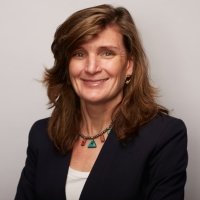
Gwen K. Young
Hosted By

Global Women's Leadership Initiative
The Global Women’s Leadership Initiative has hosted the Women in Public Service Project at the Wilson Center since June, 2012. The Women in Public Service Project will accelerate global progress towards women’s equal participation in policy and political leadership to create more dynamic and inclusive institutions that leverage the full potential of the world’s population to change the way global solutions are forged. Read more

Africa Program
The Africa Program works to address the most critical issues facing Africa and US-Africa relations, build mutually beneficial US-Africa relations, and enhance knowledge and understanding about Africa in the United States. The Program achieves its mission through in-depth research and analyses, public discussion, working groups, and briefings that bring together policymakers, practitioners, and subject matter experts to analyze and offer practical options for tackling key challenges in Africa and in US-Africa relations. Read more
Thank you for your interest in this event. Please send any feedback or questions to our Events staff.


